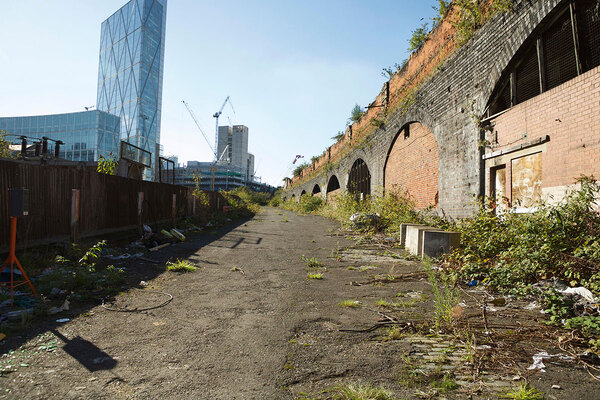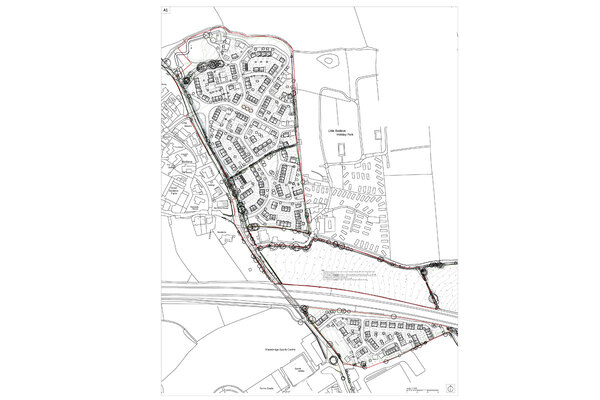You are viewing 1 of your 1 free articles
Will Brexit leave the government with any energy for housing?
There is doubt about several government housing policies and a sense of attention diverted elsewhere, writes Jules Birch
As Westminster grinds to a halt over Brexit, at least the progress is still being made on housing – or is it?
In the year of the Social Housing Green Paper and the end of the borrowing cap, some things have undoubtedly moved but the signs at Housing Communities and Local Government questions on Monday were of progress on others grinding to a halt.
First up was the land question, and specifically the way that the Ministry of Housing, Communities and Local Government dashed hopes of radical reform of land value capture in its response to a Housing, Communities and Local Government Committee report recommending big changes to a system that sees planning permission for housing increase the value of agricultural land by 100 times.
Why would the government not go further, asked committee chair Clive Betts, when support for a change to the Land Compensation Act 1961 was coming from across the political spectrum?
“The government is ‘reflecting’ on Sir Oliver Letwin’s recommendations, which do not go far enough for reformers but are too much for house builders and landowners.”
Housing secretary James Brokenshire said it was “worth bearing in mind” that Section 106 and the Community Infrastructure Levy already capture £6bn of value. (Worth it, yes, but what about the remaining profit of £13bn a year that goes to landowners?)
The government is ‘reflecting’ on Sir Oliver Letwin’s recommendations, which do not go far enough for reformers but are too much for house builders and landowners, so it will be interesting to see the response in the new year.
But his answer to a question from Tory MP Scott Mann about value capture for sites not already earmarked for development did not inspire confidence. It was all about getting more homes, said Mr Brokenshire, and “the best way to do that is through local plans”.
That set up his Labour shadow John Healey to draw an explicit parallel with the wider chaos at Westminster to claim that “this is a government who delay and duck the big decisions on housing, because they are too dysfunctional and too divided, just as they are on Brexit”.
For all Mr Brokenshire’s protestations about the government’s policies being “not about the many, not about the few; they are for everyone”, it was hard to disagree.
The same sense of attention focused elsewhere came as MPs pressed ministers about the response to Grenfell. Mr Brokenshire hailed “progress” on getting families from the tower and Grenfell Walk rehoused but Labour’s Sarah Jones said that 18 months after the fire a quarter of them are still in temporary accommodation.
She also pressed him on sprinklers, which are required in new tall buildings but have only been fitted in 4% of council blocks in London. “The government have brushed away every single request for help as non-essential,” she said. “Why do the government continue to stigmatise and discriminate against social housing tenants?”
The housing secretary referred back to green paper proposals to tackle stigma but resorted to the standard and non-committal form of words about sprinklers used by ministers over the past 18 months: ‘If local councils require flexibilities to be able to assist with that, we will certainly consider that fairly’.
However, it was not just Labour calling for action on fire safety, as two senior Conservative backbenchers pressed him for action on cladding and who pays for its replacement.
While the government has moved to ban combustible cladding on new buildings, Bob Blackman said 543 buildings were being built or refurbished with combustibles and “worse still, 1,338 buildings have combustible cladding”. What was the minister doing to enforce the ban and ensure that leaseholders do not pay?
“It was not just Labour calling for action on fire safety, as two senior Conservative backbenchers pressed Mr Brokenshire for action on cladding.”
The response from Mr Brokenshire was more standard stuff but he stopped well short of claiming that the government’s recent move to back local authorities in enforcement action on private blocks with combustible cladding will ensure this:
“I have made it clear that building owners are responsible for the safety of their buildings and they should protect leaseholders from costs. Local authorities have our full support to take enforcement action to make buildings safe, and it is our priority to ensure that people are safe and secure in their homes.”
Bob Neill put his finger on the problem. While the government has given local authorities the power to carry out emergency cladding replacement work and charge the owners, “many owners are able to claim against the leaseholders for the costs under the terms of their leases, and that anomaly defeats the government’s policy”.
Mr Brokenshire said he would meet him to discuss this and added none too convincingly that: “Many people are meeting those costs, but where that is not happening, I shall also be happy to challenge those concerned and make the point clear.”
The same sense of doubt surrounds the wider issue of leasehold reform, with Mr Brokenshire promising a consultation response “in due course”.
Asked by Labour’s Justin Madders why he had met developers and freeholders but not the National Leasehold Campaign, he said: “I look forward to engaging with leaseholders and everyone across the sector to see that reform happens”.
The government would not hold the inquiry into leasehold mis-selling backed by Labour because “having a review… is about deferring things”.
However, there was also a reminder that concerns about leasehold are not just about greedy house builders. Labour’s Seema Malhotra raised the case of A2 Dominion presenting leaseholders in her Feltham and Heston constituency with water bills of £900 per flat payable within 90 days “with the only explanation being that it had not read the water meter for two years”. Mr Brokenshire called this “especially appalling”.
“Next year could see action to improve the lives of millions of tenants – or just the appearance of it.”
And one final reminder of government (in)action came when Conservative MP Laurence Robertson asked about carbon neutral homes. “At a time when the government are urging more housebuilding and looking at climate change as well, would it not be a good time to change building regulations so that all houses are self-sufficient in electricity?”
Older readers may remember a time when the government was planning to do exactly that with a bold plan to make all new homes zero-carbon by 2016.
After that was watered down and abandoned, this one, said housing minister Kit Malthouse, is planning a consultation in the spring on “an uplift to the energy efficiency requirements for new homes” but only “where there are safe, practical, cost-effective and affordable opportunities to do so”.
This year is drawing to a close, with the government due to respond to several other key consultations on housing, including longer tenancies in the private rented sector and the sweeping package of good intentions in the Social Housing Green Paper.
Next year could therefore see action that could improve the lives of millions of tenants – or just the appearance of it. Has this government got the energy left for anything other than Brexit?
Jules Birch, award-winning blogger, Inside Housing
Read more about Brexit
Brexit and the social housing sector: the key risks As the tortuous process of exiting the European Union approaches its denouement, the country remains in a state of uncertainty about what exactly is going to happen. Peter Apps recaps the key risks to the social housing sector
Downturn: why is L&Q cutting its surplus in half and what does it mean for the sector After L&Q revealed it is likely to cut its surplus by £158m this year, Peter Apps asks what this means for the financial model which has defined the housing association sector since 2010
What housing associations are doing to stress-test for Brexit With the UK’s departure from the EU looming, Luke Barratt looks at what housing associations have been doing to prepare
Regulator writes to housing associations with no-deal Brexit warning The regulator has issued a warning to housing associations over the threat of a no-deal Brexit, outlining key risk areas including shortages of crucial materials, a housing market crash and difficulties accessing ‘business-critical’ data
Sector draws up contingency plans for no-deal Brexit The country’s largest housing associations are putting in place contingency plans to protect the future of their organisations
How would the sector cope with a no-deal Brexit? As uncertainty around Brexit mounts and a no-deal looms, Inside Housing asks what it could mean for the housing sector
Current grant system won’t work in a falling market The government needs to think again about grant to prevent housing association development from collapsing in a falling market, writes Matthew Bailes.
S&P would downgrade half its rated housing associations after no-deal Brexit The credit ratings agency Standard & Poor’s (S&P) has said it will downgrade associations it rates if the UK leaves the European Union without a deal
Click here for all our Brexit news to date
Never Again campaign
In the days following the Grenfell Tower fire on 14 June 2017, Inside Housing launched the Never Again campaign to call for immediate action to implement the learning from the Lakanal House fire, and a commitment to act – without delay – on learning from the Grenfell Tower tragedy as it becomes available.
One year on, we have extended the campaign asks in the light of information that has emerged since.
Here are our updated asks:
GOVERNMENT
- Act on the recommendations from Dame Judith Hackitt’s review of building regulations to tower blocks of 18m and higher. Commit to producing a timetable for implementation by autumn 2018, setting out how recommendations that don’t require legislative change can be taken forward without delay
- Follow through on commitments to fully ban combustible materials on high-rise buildings
- Unequivocally ban desktop studies
- Review recommendations and advice given to ministers after the Lakanal House fire and implement necessary changes
- Publish details of all tower blocks with dangerous cladding, insulation and/or external panels and commit to a timeline for remedial works. Provide necessary guidance to landlords to ensure that removal work can begin on all affected private and social residential blocks by the end of 2018. Complete quarterly follow-up checks to ensure that remedial work is completed to the required standard. Checks should not cease until all work is completed.
- Stand by the prime minister’s commitment to fully fund the removal of dangerous cladding
- Fund the retrofitting of sprinkler systems in all tower blocks across the UK (except where there are specific structural reasons not to do so)
- Explore options for requiring remedial works on affected private sector residential tower blocks
LOCAL GOVERNMENT
- Take immediate action to identify privately owned residential tower blocks so that cladding and external panels can be checked
LANDLORDS
- Publish details of the combinations of insulations and cladding materials for all high rise blocks
- Commit to ensuring that removal work begins on all blocks with dangerous materials by the end of 2018 upon receipt of guidance from government
- Publish current fire risk assessments for all high rise blocks (the Information Commissioner has required councils to publish and recommended that housing associations should do the same). Work with peers to share learning from assessments and improve and clarify the risk assessment model.
- Commit to renewing assessments annually and after major repair or cladding work is carried out. Ensure assessments consider the external features of blocks. Always use an appropriate, qualified expert to conduct assessments.
- Review and update evacuation policies and ‘stay put’ advice in the light of risk assessments, and communicate clearly to residents
- Adopt Dame Judith Hackitt’s recommended approach for listening to and addressing tenants’ concerns, with immediate effect
CURRENT SIGNATORIES:
- Chartered Institute of Housing
- G15
- National Federation of ALMOs
- National Housing Federation
- Placeshapers












